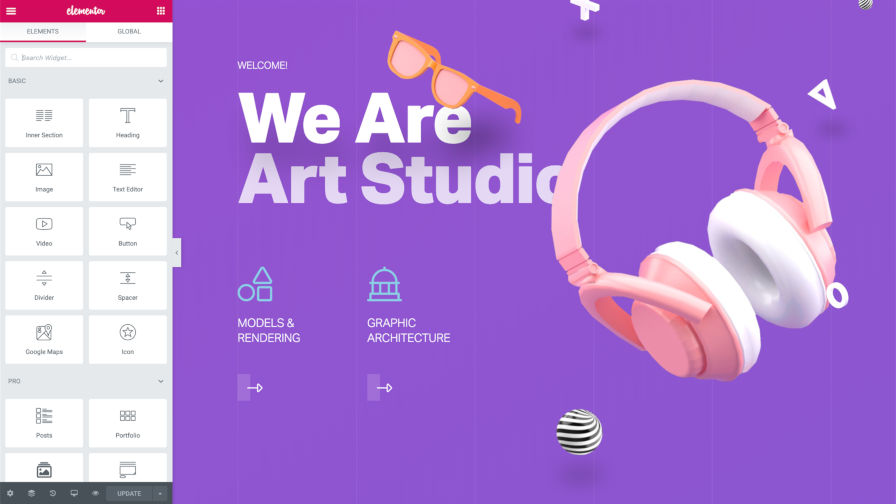
As Elementor, the most-used WordPress page builder, celebrated its first round of funding at $15 million, some of our readers questioned whether this was a sound investment. With movement in the Gutenberg plugin toward a full-site editing solution, which will eventually make its way into core WordPress, it is a valid concern. Will page builders remain competitive once WordPress begins taking over this role, likely sometime in 2021?
While Elementor has seemingly pulled far ahead of the competition with over 4 million installations, there is a much wider market of page-building solutions that end-users are installing. The free version of Beaver Builder has over 400,000 installs and Visual Composer has over 70,000. In the commercial space, Divi has over 600,000 customers and WP Bakery has seen 388,000 sales. These numbers don’t include the numerous other page-building plugins and custom solutions that developers build with libraries like Advanced Custom Fields and Meta Box. Some themes also offer some form of a page builder but typically not as robust as plugins.
All of this is to say that there is a huge market right now. Based on current trends, growth for page builders is accelerating rather than slowing down. My educated guess is that we are nowhere near the ceiling.
From the comments on our recent coverage of Elementor’s investment round, one of our readers named Anto had a few thoughts on the future. “I’m happy that WordPress is getting more external investment, but I find it hard to imagine how Elementor has a long-term future in WordPress with their thinking,” he said. “Sure, it has a place now, and will for at least a few more years, but as Gutenberg matures why would anyone want the added bloat? Once you abstract the window dressing, all page builders (including Gutenberg) are fairly similar. The remaining differences are a matter of workflow and taste because moving blocks/sections around isn’t unique.”
Yoni Luksenberg, CEO and co-founder of Elementor believes the future is bright. “We believe in democratizing the editor so different WordPress users and different personas will have their editor of choice,” he said in an interview. “This way, they can pick the editor that best fits their unique needs and preferences. This is the beauty of open source. There are endless ways to build a contact form: Contact Form 7, Gravity Forms, Jetpack Forms. Similarly, there are endless ways to build and design a web page. The users should have the option to choose their preferred method.”
Anto believes the choice between contact forms is not comparable to the choice between editors or builders. Because the block editor is a part of the core platform, it would provide stiffer competition for a builder plugin. “Will people have different preferences that the ecosystem will fill?” he asked. “Of course, these will be the block plugins, style/feature plugins, and additional layers of complexity that will evolve as Gutenberg matures, but they will all be built on core WordPress (Gutenberg) because doing anything else is just duplicative bloat.”
It is not clear what users will do in a year or two down the road. However, there is a significant portion of end-users who are not currently satisfied with what WordPress is offering. WordPress fell behind the market and plugin developers filled the void with solutions to meet demand. It is now playing catch-up with these page builders. Even with all the resources being thrown toward the block system and eventual full-site editing, we are miles away from a baseline working solution beyond content editing.
“At some point of time Gutenberg is going to be at least as powerful as the free version of the Elementor plugin,” said Richard Ginn in the comments. “Gutenberg to me is getting more powerful at a faster rate than Elementor is.”
One thing page builders have going for them is their current user base. It is human nature to stick with tools that are familiar and comfortable. I do not imagine most page builders will lose large user numbers as long as they are offering the solutions that users want or need. Even if WordPress offers a more robust solution within the next couple of years, user trust will be with existing plugins, and that is a hard thing to win back once it has been lost.
With its recent funding round, Elementor is planning on growing its team and speeding up feature development. Other page builders will need to keep up and continue finding ways to remain competitive. Right now, page builder usage numbers are on the rise in the early block editor era. We could see a lot more innovation in this space in the next couple of years. Elementor’s investment round validates a maturing market that is a direct competitor to core’s block system.
This level of competition is healthy for the ecosystem. The rise of page builders will undoubtedly push Gutenberg and WordPress development to new heights. There is a multi-million dollar market for third-party builders that is hard to ignore. I don’t see it going anywhere anytime soon.
This post is part of a new From the Comments series where we highlight interesting points of discussion from comments on WP Tavern articles. The hope is to give these comments, which can sometimes get lost, the attention they deserve.
Nice idea for a series!